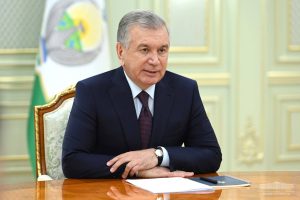On November 6, 2021, in his second inaugural speech, Uzbekistan’s President Shavkat Mirziyoyev proclaimed the time was right to update the country’s constitution. “In many countries, constitutional reforms were carried out during a period of dramatic changes,” he said, defining his hoped-for constitutional amendments as “the essence” of the reforms his government had committed to carrying out.
In the referendum that was held on April 30, 2023, according to official statements, over 90 percent of voters approved the changes. Although the updated constitution has provisions on human rights and freedom of speech, these are overshadowed by the reality that the true purpose of the referendum was to cement Mirziyoyev in the presidency for many years to come. Soon after the referendum, Mirziyoyev called for a snap presidential election, to be held in early July. Everything the Uzbek president has done, quite like his constitution, is a mere populist move and a façade for efforts to tighten his grip on power.
When Mirziyoyev came to power in 2016, the bar was already low. Before him, Islam Karimov, the first president of Uzbekistan, ruled the country with an iron fist for over 25 years. In the West, Karimov was known as a tyrant who boiled prisoners alive, suppressed religious freedoms, expelled foreign human rights activists and journalists while arresting locals, and killed the regime’s opponents abroad. He crushed every form of dissent, starting with a students’ riot over “soaring prices and bread shortages” in Tashkent in 1992, which ended with the death of two people according to the government’s account (many more in other accounts), and extending to the massacre of protesters in Andijan in 2005, which a Guardian headline at the time guilelessly hoped signaled the “end of Karimov’s regime.”
At home, Karimov fashioned himself as the founding father of Uzbekistan – the one who led the country to independence and built a foundation for the nation’s future prosperity. The prosperity he envisioned was perpetually imminent. “Uzbekistan is a country with a great future!” was one of his most famous sayings; it was displayed on billboards and placards all over the country, including in schools and local government offices. Every restriction Karimov’s government imposed – be it on the freedom of speech or movement or conscience – was explained as a sacrifice in the name of peace and stability.
Because Mirziyoyev was handpicked by Karimov himself in 2003 and worked as his prime minister for 13 years, he could not fully distance himself from Karimov’s name even after the first president’s death. Instead, he promised to continue Karimov’s political legacy. “Since the first days of our country’s independence, Mirziyoev has gained the high trust of the First President of the Republic of Uzbekistan, Islam Karimov, and has been working effectively as his close colleague and adviser,” read the biography of Mirziyoyev posted on the website of the Liberal Democratic Party, Uzbekistan’s ruling party, when it was shared with the public for the first time at the start of the presidential campaign in 2016.
Yet Mirziyoyev tried to paint a different portrait of himself as the 2016 election aimed to secure his hold on power. He chose to be cast as a “reformer.”

































